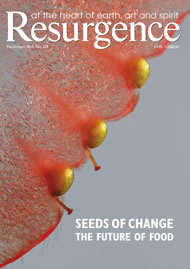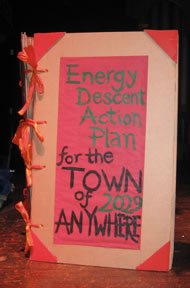For me, there was a definite moment when my environmental awakening began in earnest. I was studying philosophy at the University of York a decade ago when, out of the blue, I received an email from my father alerting me that “a long-term survey of oil and gas resources shows that demand for oil will exceed the maximum possible supply by 2010 and the oil price will sky-rocket”. This was followed by his (enduringly plausible) outline of the likely consequences – economic collapse, mass starvation and war.
I took a deep breath.
My initial reaction, like that of so many in their ‘peak oil moment’, was one of shock, rapidly followed by disbelief. I wondered how there could be near-universal silence on this issue if it truly had such vast implications, and tried to assure myself that ‘they’ would surely find some solution. Nonetheless, I resolved to look into it, partly in the hope of reassuring my father. Needless to say, what I learned wasn’t particularly reassuring.
As my studies came to an end, I quickly found myself with some appropriately philosophical questions to answer. The familiar post-university concerns of finding a way to earn some money, enjoying myself and caring for friends and family had to be balanced with two added factors – a sense that a ‘sound career path’ might not prove so sound in a civilisation that might be heading for the buffers, and an understanding that the world desperately needed all hands on deck if it was to have a future at all.
My attempts to discuss all this with my peers met with limited success. They reminded me that many people, both in our culture and around the world, are struggling to get by, and that I would need all the time I had just to look after myself and my family. Some suggested that I should be wary of having my life derailed by all this environmentalist rubbish, which had predicted ‘the end of the world’ so often before.
Others argued sadly that we must accept that it is simply human nature to go on being short-sighted and environmentally destructive. But that just sounded like a self-fulfilling prophecy. The many inspiring historical examples of human selflessness, wisdom and foresight must, if nothing else, show that we have a choice in these matters. Indeed, it seemed to me that those of us fortunate enough to have the time, education and mental health to perceive and face the circumstances of our world have a responsibility to act. If many others cannot, that is all the more reason why we must.
As Paul Hawken has since put it, maybe we are the world’s immune system. And where would any of us be if our own immune system got distracted seeking its personal fortune, say, or pursuing hedonistic diversions?
But while this musing was all very fine sitting in my university common room, how could I apply it to my life? My degree had failed to provide a helpful module on such ‘Applied Philosophy’ so, like everyone else, I had to make it up as I went along.
Time for another deep breath.
I did find one useful touchstone, a quote from the American theologian Howard Thurman:
“Don’t ask what the world needs. Ask what makes you come alive, and go do it. Because what the world needs is people who have come alive.”
Wonderful stuff, but to ‘come alive’ I also needed to stay alive, so when a job offer came on the very day my bank account hit empty, I decided to take it, working as an administrator at a project for marginalised groups where I had previously volunteered.
Over the next few years I worked my way up to a position I loved – managing the project’s learning centre – paid off my student debts, and spent much of my spare time learning more about the state of our world. Unfortunately, these investigations led to a growing sense that ultimately there wasn’t much point in helping people to reintegrate with society if that society itself really was running off a cliff. I realised this job was no longer helping me to come alive. I felt called to something else, but what?
I didn’t know, but I left the job anyway, and spent my time reading everything I could get my hands on regarding peak oil and climate change, attending events and asking questions. Where could I best put my energies to create a peaceful, creative, resilient and diverse world?
I slowly came to see that those common room discussions about human nature were touching on just one of a wide set of cultural stories that shape and define our perception of the world. That, despite its severity and urgency, ‘Peak Climate’ is just a symptom, a product of the ways of thinking we value, respect and adopt. And that it is at this level that radical change is both necessary and assured. Of course, many have discussed the need for a rapid paradigm shift – the Age of Aquarius, the Great Turning – but I was still struggling to find my role in supporting and shaping it.
The resolution came when I found myself at Schumacher College in 2006, where I studied for a fortnight and felt more intensely alive than I had in a long time. This was surely a good sign, and here I had my first encounter with the fledgling Transition movement, which even at that early stage recognised the innate importance of stories and visions in building thriving, resilient communities.
Over the last few years I have become ever more involved with this work, and 2009 saw the publication of my first book, The Transition Timeline, which grew out of requests from Transition communities to flesh out what a realistic, positive vision for our future might look like, and for more input on the major challenges we are likely to face as we try to create it.
This allowed me to explore my fear that the Transition movement may struggle to match up to the scale of these challenges, and I found that the process shifted my own perspective. Whereas I probably started out trying to resolve all of the world’s problems single-handedly (and demanded the same of such initiatives), I have since noticed that the people and projects I respect most aren’t those who’ve tried to do everything, but those who have done the thing that they love rather brilliantly. In so doing they have, sometimes quite by accident, contributed to shifting the stories on which cultures are built.
So now I see myself not only as part of a team in my local Transition Town, but as part of a global movement to which we all lend our passions. Transition may not single-handedly save the world, but those who are trying to do so are certainly glad of its contribution, which seems a decent test of whether it is a worthwhile project.
As my book has made its way into the world, I have found myself invited to speak and write for local groups, parliaments and everything in between, and it is good to feel that I am contributing. Yet somewhere in my soul I can feel my next move gestating. At some important level, I feel called again to re-examine my role in the world.
It is time for another deep breath.








